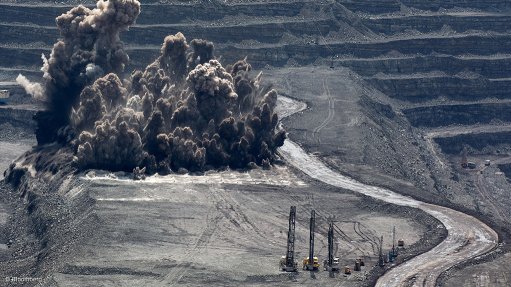
SEQUESTRATING METHANE Coaltech is looking for methods to remove methane from coal during production before it reaches the atmosphere
Photo by: Bloomberg
While the development of clean coal energy is an imperative amid climate change, the worthwhile gains are more in the downstream use of coal than in the mining and beneficiation of raw coal, says South African coal mine research association Coaltech CEO Henk Lodewijks.
He tells Mining Weekly that industry’s efforts, through Coaltech, to date, have been focused on better use of coal by reducing the generation of waste products such as fly ash.
“Industry continues to explore methods of sequestrating methane, which is a powerful greenhouse gas, from the coal before it can escape into the atmosphere,” Lodewijks adds.
Coaltech is also working with coal mining engineers and geologists to find solutions to reduce exposure to dust, as well as reduce the impact of spontaneous combustion at opencast coal mines. The research group also aims to find solutions to prevent methane and dust ignitions, and improve the extraction of coal locked in underground pillars.
He indicates that, to preserve the environment and biodiversity in coal mining areas, Coaltech wants the industry to improve the rehabilitation of affected soils, reduce the impact of opencast mining on soils and develop a better system to mitigate acid mine drainage.
Lodewijks acknowledges that water is an important resource for the coal mining industry, adding that the association wants coal mining companies to reduce or preferably eliminate the use of water during coal preparation and beneficiation. “Consequently, Coaltech’s focus areas are to reduce the use of and preserve the quality of water.”
Safety, Research and Development
Despite the Safety in Mines Research Advisory Committee, of the Department of Mineral Resources, being the statutory custodian of mine safety, Coaltech also occasionally pursues safety-related research and development (R&D) initiatives in cases where production techniques or processes are inherently intertwined with safety considerations.
For example, Coaltech is doing research to measure the explosives temperatures in blast holes that are affected by spontaneous combustion and the elimination of methane ignitions on continuous miners.
He notes that, as part of the association’s work to develop a skills base in the coal mining industry, Coaltech has over the years allocated a considerable amount of its R&D funding to provide bursaries for postgraduate students. It provided more than 115 bursaries between 1998 and 2016.
Coaltech is a voluntary organisation of coal mining companies, State-owned power utility Eskom, government and labour that coordinates R&D on behalf of its members.
Coaltech will host its yearly colloquium at the Ridge Dome, in Witbank, Mpumalanga, on March 16. The colloquium will feature topics on the issues of environment as well as coal processes and mining, Lodewijks says.